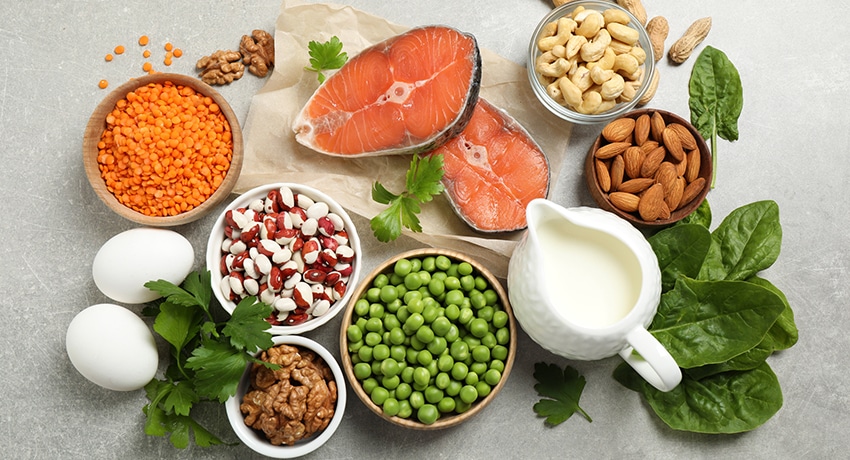Does protein feel like a buzzword in the linguistics of social media and grocery store marketing? It’s definitely accurate. Industry stats from Brandwatch revealed online search interest reached a five-year high in 2023 for individuals talking about high-protein food – and has remained high since then. All this conversation can certainly reveal common protein myths.

“Protein is trending due to the rise in popularity of high-protein, low-carb diets,” said Katherine Gerber, RD, a certified diabetes care and education specialist with UT Physicians Multispecialty – Cinco Ranch. “Often, people are using these diets for weight loss, to control their diabetes, and other various health concerns.”
With all of the competing advice for optimum protein intake and why, it’s hard to know what to believe. Here are a few common protein myths you should know to make the most informed decision around your protein goals.
Myth #1: Eating protein is only important for people who want to build muscle.
Protein is essential for everyone because it impacts so many functions of the body. In addition to building muscle, it repairs tissues, transports nutrients, makes antibodies to fight infection, and helps build strong bones.
It continues to be important as we age since protein impacts our ability to preserve bone and muscle. The Osteoporosis Foundation even takes a stand regarding protein: Seniors who lack protein have less muscle strength, which increases their risk of falls and optimal recovery after a fracture.
There are other notable benefits of higher protein meals and snacks, said Gerber. Protein helps the feeling of fullness.
“This can help people on their weight loss journey by curbing unwanted snacking, cravings, and overeating,” she said.
Protein is also slower to digest than carbohydrates and has minimal impact on blood sugar. Gerber said this can be helpful for people working to control their diabetes.
Myth #2: Chicken and eggs are the main food sources of protein.
Gerber said protein is found in both animal proteins and plant-based proteins. Most people think of chicken and eggs as the go-to sources, but the food options are plentiful when considering high-protein food.
Animal proteins
This is what most people think of first when they think of protein. These include poultry, seafood, dairy, eggs, lean red meat, and pork.
Plant-based proteins
There are plenty of options available when considering protein for a plant-based diet. These include seeds, nuts, beans, tofu, grains (oats, rice, wheat, cornmeal, farro, rye, pasta, etc.) some vegetables (leafy greens, broccoli, asparagus, mushrooms, green peas, Brussels sprouts, and others), and soy products.
High-protein snack ideas
A few snack ideas in the real world are things like roasted chickpeas, Greek yogurt, cottage cheese and berries, trail mix, hard-boiled eggs, and peanut butter on apple slices.
Myth #3: You should eat 1 gram of protein per pound of body weight.
Protein requirements vary depending on age, sex, weight, and level of physical activity.
Gerber said the recommended daily allowance is 0.8 grams of protein per kilogram of body weight (.36 grams per pound) to meet basic nutritional requirements. This translates to about 45 grams (125-pound person) to 60 grams (170-pound person) of protein.
Protein needs increase as we age due to muscle loss, which begins in our 30s. The needs increase to 1-1.2 grams of protein per kilogram of body weight.
For people who exercise regularly, the American College of Sports Medicine recommends increased protein. A person who lifts weights regularly or is training for an endurance event should eat 1.2-1.7 grams of protein per kilogram of body weight.
Focusing on long-term success
Gerber said there are many fads, diets, and opinions at your fingertips. The goal is to make informed choices that work for you, not an influencer you follow on social media.
“Ultimately, we are trying to work toward healthy habits to last a lifetime,” Gerber said. “Focusing on a balanced way of eating, and modifying based on individual needs, often will contribute to long-term success with health goals.”



